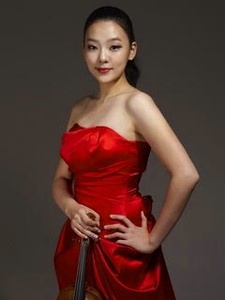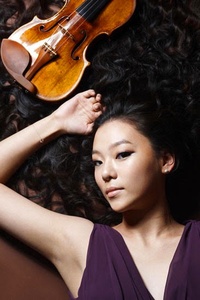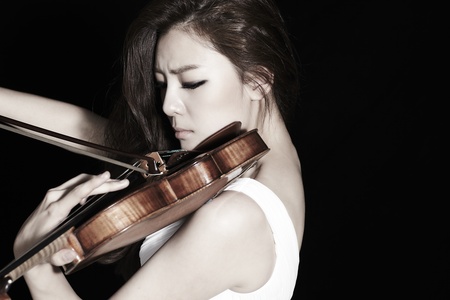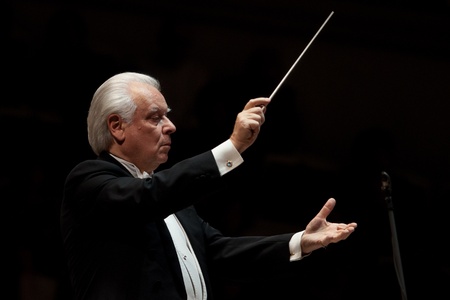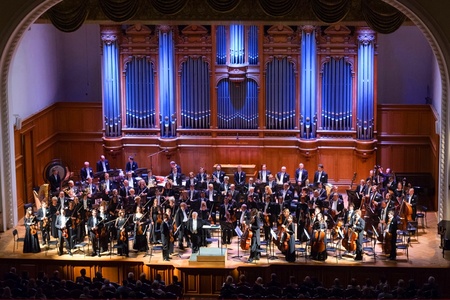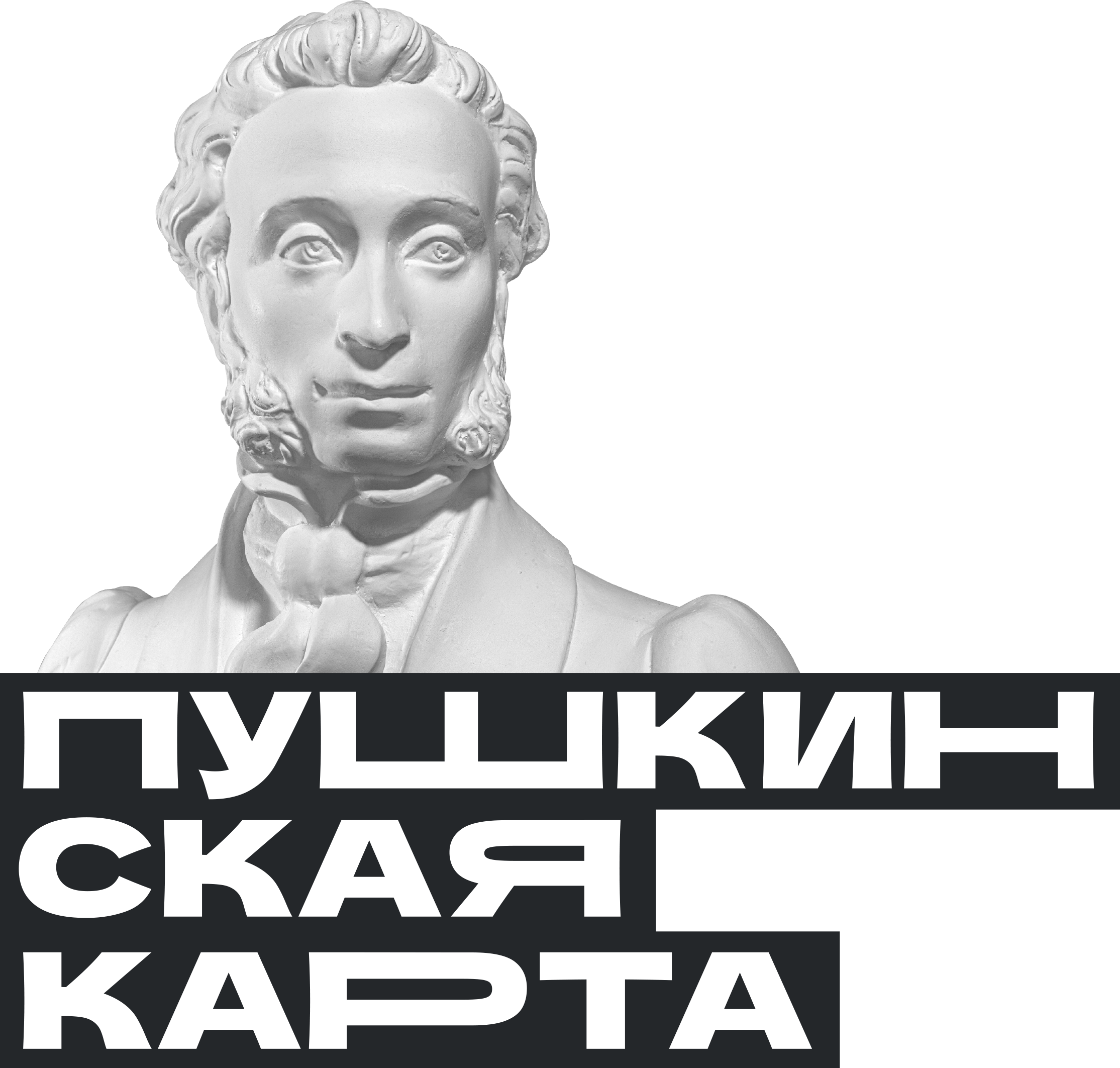Moscow Philharmonic Orchestra,
Yuri Simonov, Clara-Jumi Kang
February 5, 2017
Great Hall of the Moscow Conservatory
Moscow Philharmonic Orchestra
Throughout its history, the Moscow Philharmonic Orchestra has ranked among the best national orchestras and has been a worthy representative of Russian musical culture abroad.
The orchestra was founded in September 1951 under the Soviet Radio Committee and joined the Moscow Philharmonic Society in 1953. Its artistic image and performing style were built under the guidance of renowned Russian conductors. The ensemble's first Artistic Director and Principal Conductor was Samuil Samosud (1951–1957). In 1957–1959, the orchestra, led by Nathan Rachlin, was considered as one of the best in the USSR. In 1958, at the 1st International Tchaikovsky Competition, the orchestra, conducted by Kirill Kondrashin, accompanied a triumphant performance by Van Cliburn, and in 1960 it was the first Russian symphony orchestra to tour the USA.
Kirill Kondrashin led the Moscow Philharmonic Orchestra for 16 years (1960–1976). Those years were important milestones in the ensemble's history: the maestro conducted the premieres of Shostakovich's 4th and 13th Symphonies, his poem The Execution of Stepan Razin, Prokofiev's Cantata for the 20th Anniversary of the October Revolution, performed and recorded many Mahler symphonies. In 1973 the orchestra was awarded the title of Academic. Under Dmitry Kitaenko (1976–1990) the orchestra extended its 20th century repertoire, premiering works by Khrennikov, Denisov, Schnittke, Butsko, and Tishchenko. Messiaen's Turangalîla-Symphonie, Stravinsky's King of the Stars (Zvezdoliki) and Requiem Canticles were performed for the first time in the USSR. The ensemble was subsequently led by Vasily Sinaisky (1991–1996) and Mark Ermler (1996–1998).
The orchestra has collaborated with leading Russian and international conductors including André Cluytens, Igor Markevitch, Charles Munch, Zubin Mehta, George Enescu, Neeme Järvi, Mariss Jansons, Dzhansug Kakhidze, Kurt Mazur, Evgeny Svetlanov and composers Benjamin Britten, Igor Stravinsky, and Krzysztof Penderecki. It is with this orchestra that Sviatoslav Richter made his sole appearance as a conductor. Virtually all major soloists of the second half of the 20th century have appeared with the orchestra, including Isaac Stern, Yehudi Menuhin, Glenn Gould, Emil Gilels, David Oistrakh, Leonid Kogan, Daniil Shafran, Yakov Flier, Nikolai Petrov, Mstislav Rostropovich, Vladimir Krainev, Maurizio Pollini, Eliso Virsaladze, and Natalia Gutman. The orchestra has recorded over 350 LPs and CDs, many of which have received the highest international recording awards and are still in demand today.
A new stage in the history of the Moscow Philharmonic Orchestra began in 1998, when it was taken over by People's Artist of the USSR Yuri Simonov. Under his leadership, the ensemble has achieved tremendous success. Today the orchestra is one of the mainstays of Russian philharmonic life, frequently performing in cities across Russia (over the last ten years they have appeared in more than 40 cities) and successfully touring Great Britain, Germany, Spain, Japan, Hong Kong, China, and Korea.
In recent decades, the orchestra has played with such outstanding musicians as: Marc-André Hamelin, Valery Afanassiev, Yuri Bashmet, Boris Berezovsky, Yuja Wang, Maxim Vengerov, Stefan Vladar, Hibla Gerzmava, David Geringas, Barry Douglas, Lilya Zilberstein, Sumi Jo, Laura Kleikomb, Alexander Kniazev, Sergey Krylov, John Lill, Nikolai Lugansky, Konstantin Lifshitz, Oleg Maisenberg, Denis Matsuev, Ekaterina Mechetina, Viktoria Mullova, Daniel Pollak, Vadim Repin, Sergey Roldugin, Dmitry Sitkovetsky, Viktor Tretyakov; Conductors Luciano Acocella, Semyon Bychkov, Alexander Vedernikov, Michael Güttler, Alexander Dmitriev, Marco Zambelli, Thomas Sanderling, Alexander Lazarev, Andres Mustonen, Vasily Petrenko, Benjamin Pionnier,
Gintaras Rinkevičius, Alexander Sladkovsky, Leonard Slatkin, Saulius Sondeckis, Antonino Fogliani, Mariss Jansons and many others.
One of the orchestra's priorities is working with the new generation of musicians: as part of the Stars of the 21st Century series, the orchestra plays with gifted soloists entering the big stage and invites young performers to join its philharmonic subscription programmes. The orchestra is a regular participant of international and Russian master courses for young conductors by Yuri Simonov, organized by the Moscow Philharmonic society.
The activities of Maestro Simonov and the orchestra also aim at educating young listeners. The subscription series Tales with an Orchestra, taking place in Moscow and many Russian cities and featuring theatre and film stars, has become hugely popular. Guest stars have included Marina Alexandrova, Maria Aronova, Alyona Babenko, Valery Barinov, Sergei Bezrukov, Anna Bolshova, Olga Budina, Valery Garkalin, Sergei Garmash, Nonna Grishaeva, Ekaterina Guseva, Evgenia Dobrovolskaya, Mikhail Yefremov, Evgeny Knyazev, Avangard Leontiev, Pavel Lyubimtsev, Dmitry Nazarov, Alexander Oleshko, Irina Pegova, Yulia Peresild, Mikhail Porechenkov, Evgeniya Simonova, Grigory Siyatvinda, Daniil Spivakovsky, Yuri Stoyanov, Evgeny Stychkin, Victoria Tolstoganova, Mikhail Trukhin, Gennady Khazanov, Chulpan Khamatova, Sergey Shakurov. This project brought Maestro Simonov the Moscow Mayor's Arts Award in 2008, while in 2010, Yuri Simonov and the orchestra received the National Newspaper Musical Review Award in the Conductor and Orchestra category.
In recent years, the ensemble has presented several Moscow, Russian and world premieres of works by Andrei Eshpai, Boris Tishchenko, Krzysztof Penderecki, Philip Glass, Alexander Tchaikovsky, Sergei Slonimsky, Valentin Silvestrov, Eduard Artemyev, Gennady Gladkov, Sofia Gubaidulina, Alexei Rybnikov, Efrem Podgaits, Kuzma Bodrov and other composers.
Yuri Simonov
Yuri Simonov was born in 1941 in Saratov into a family of opera singers. He was barely twelve the first time he stood
on the conductor’s rostrum to conducting Mozart’s G minor symphony with the
orchestra of the Saratov Music School, where he studied the violin. In 1956, he was accepted by the junior
department of the Leningrad Conservatory, where he later completed his
undergraduate studies in 1965 as a viola student of Y. Kramarov and as a
conductor in the class of N. Rabinovich (1969). He was still a student when he won a prize
at the 2nd Soviet Union Conductors’ Competition (1966) and as a
result was invited to the Kislovodsk Philharmonia as Chief Conductor.
In 1968 Simonov became the first Soviet conductor to win an international competition, the 5th organised by the St Cecilia Academy in Rome. This was reported by Il Messaggero: “the absolute winner of the competition was a twenty-seven year old Russian conductor, Yuri Simonov. This is a great talent, full of inspiration and charm. The exceptional qualities which marked him out for both the public and the jury were his extraordinary capacity to engage the audience, his inherent musicality and the strength and clarity of his gestures. Lets celebrate this youngster who will no doubt become a custodian of great music. After this event he was immediately invited by Yevgeny Mravinsky to become his assistant at the Leningrad Philharmonic Orchestra and he joined him on a tour of Siberia. Yuri Simonov has retained his contact with this orchestra until the present time. Apart from concerts in the Great Hall of St Petersburg Philharmonia he has joined them for tours of the UK, Austria, Germany, Switzerland, France, Holland, Spain, Italy and the Czech Republic.
In January 1969 Simonov made his début at the Bolshoi Theatre in Verdi’s Aida and the following February, after his triumphant performances on tour in Paris, he was appointed Chief Conductor of the Bolshoi Theatre, a position he held for more than fifteen years, a record in the history of this theatre. His time there included many historical moments in the life of this theatre, the premieres of jewels of the operatic repertoire such as Glinka’s Ruslan & Ludmilla, Rimsky-Korsakov’s The Maid of Pskov, Mozart’s Cosi fan tutte, Bizet’s Carmen, Shostakovich’s The Golden Age, Schedrin’s Anna Karenina and Bluebeard’s Castle and The Wooden Prince by Bartok. In 1979, Wagner’s Rhinegold marked the composer’s return to the theatre after a 40-year break.
His greatest achievement at the Bolshoi, however, was throughout his tenure there to sustain the highest standards in repertoire performances whilst supporting the vital process of continuous renewal of the artistic forces. The result of this work was that works such as Boris Godunov (Mussorgsky), Khovanshchina (Mussorgsky), Prince Igor (Borodin), The Queen of Spades (Tchaikovsky), Sadko (Rimsky-Korsakov), The Tsar’s Bride (Rimsky-Korsakov), Cosi fan tutte (Mozart), Don Carlos (Verdi), Petrouchka and the Firebird (Stravinsky) became trademark performances of the theatre. Every day he dedicated many hours to working with rising talents, providing them with a solid basis for their own professional development and leaving an artistic legacy after departing from the theatre in 1985. The scale of achievement of Yuri Simonov during this period is impressive enough but the simple statistics speak for themselves: in any one season, he conducted more than eighty performances of at least ten different works produced under his direction. At the end of the 1970s Yuri Simonov organised a chamber orchestra of young enthusiasts from the theatre orchestra, a group which toured successfully in its own right in the soviet Union and abroad, engaging such soloists as I. Arkhipova, E. Obraszova, T. Milashkina, Y. Mazurok, V. Malychenko, M. Petukhov, T. Dokshitzer and other significant artists of the time.
Between 1980 and 1990, Simonov undertook performances in major theatres around the world, starting with his début at Covent Garen in Eugene Onegin, followed four years later by La Traviata. Other Verdi operas include Aida in Birmingham, Don Carlos in Los Angeles and Hamburg, La forza del destino in Marseilles, Mozart’s Cosi fan tutte in Genoa, R.Strauss’ Salome in Florence, Mussorgsky’s Khovantchina in San Francisco, Tchaikovsky’s Eugene Onegin in Dallas, and Queen of Spades in Prague, Paris and Budapest.
In 1982, he received an invitation to conduct a series of concerts with the London Symphony Orchestra, which marked the start of a fruitful relationship. At the same time many symphonic orchestras around the world invited him as a guest conductor and this led to appearances at leading international festivals including Edinburgh, Tanglewood, Paris, Prague Spring and Autumn festivals and Budapest Spring festival.
From 1985-89 he founded and directed a new State symphony orchestra with which he toured the former Soviet Union as well as Italy, Hungary, Poland and Germany. At the beginning of the 1990s, he was the Chief Guest Conductor of the Buenos Aires Philharmonic Orchestra and from 1994-2002 Music Director of the Belgian National Orchestra. In 2001, he founded the Liszt-Wagner Orchestra in Budapest where he has been a guest conductor of the Hungarian State Opera for more than 30 years. The highlights of this relationship were ten operas by Wagner, including all the Ring operas. Apart from opera performances and many concerts with practically every Budapest ensemble, he also led international masterclasses for conductors in Hungary from 1994-2008, which brought him more than 100 students from 30 countries. Hungarian television made three films about him.
Maestro has always combined his heavy artistic commitments with teaching. From 1978-91 he was Professor of opera and symphonic conducting at the Moscow Conservatoire and since 2006 he has been teaching conducting at the St Petersburg Conservatoire and holding masterclasses both in Russia and abroad - in London, Tel Aviv, Almaty and Riga. To mention some of his students: T.Boganyi, D.Botinis (Sr &Jr), Y.Botnari, J.Brett, L.Harrell, G.Horvath, T.Khitrova, I.Manasherov, V.Moiseev, G.Rincavichus, A.Rubin, Y.Samoylov, D.Sitkovetsky, P.Sorokin, M.Turgumbaev, M.Vengerov, S.Vlasov, M.Zoltowski.
Maestro Simonov was also a member of the jury of conducting competitions in Florence, Tokyo and Budapest. In 2011 and 2015, he chaired the jury of both First and Second All-Russia conductors’ competition in Moscow. At present, he is writing a book on conducting.
Since 1998, Yuri Simonov has been the Artistic Director and Chief Conductor of the Moscow Philharmonic Orchestra. Under his leadership, this orchestra has regained its former prominence. Working with this orchestra gave him an opportunity display his characteristics of strong expression and technical dexterity, combined with an ability to establish a deep trust between the audience and the performers and striking theatrical imagery. During this period, he has prepared more than 200 different programmes, which were played on tours throughout the world as well as in Moscow. The press response has rarely been less than ecstatic, with remarks such as “Simonov gets out such a breadth of emotion that its close to genius,” (Financial Times), “a towering inspiration to his players,” (The Times).
The 2008-9 season was celebrated with a special concert series entitled “Ten Years together”. 2010-11 was full with concerts in Moscow and tours in Russia and China but the main highlight were Maestro’s 70th birthday concerts in March 2011 in Moscow, Orenburg and on tour in Spain, Germany and Romania.
As well as performing concerts with the orchestra, Maestro Simonov takes a personal interest in developing the audiences of the future. He has developed special programmes combining jewels from the literary and musical heritage to appeal to young audiences, using a wealth of material but within themes from the tales of The Sleeping Beauty, Aladdin and Cinderella. Supporting the work of young musicians is no less important to him - in September 2008, he prepared the Commonwealth Youth Symphony Orchestra and toured with them to Moscow, Baku, Dushanbe, Bishkek and Almaty.
Always ready to take on new artistic liaisons, in 2010 - 2015 he appeared with the Strasbourg, Bucharest (George Enesco Philharmonic), Sofia and Zagreb Philharmonic Orchestras, with the Brabant Orchestra and Symphony Orchestra of India in Mumbai.
His repertoire comprises all styles and periods from the Baroque to the present day. Some highlights of recent premieres are S.Slonimsky’s 27th and 29 th Symphonys, B.Tischenko’s Requiem and Laces of Vologda by K.Bodrov. His own compilations from stage works by Tchaikovsky, Glazunov, Prokofiev and Khatchaturian have been very popular with audience.
Yuri Simonov, National Artist of USSR (1981), Chevalier of the Russian Order of Merit (2001), Laureate of Music and Arts, Moscow (2008), Conductor of the Year (Music Observer 2005-6), Hungarian Order of Merit (2001), Commander of the Romanian Order of Star (2003), Polish Award for Culture, Russian Order for services to the Fatherland IV Grade (2011).
His discography includes a wide repertoire produced by EMI, Melodia, Collins Classics, Cypres, Hungaroton, Le Chant du Monde, Pannon Classic, Sonora, and Tring International, and Kultur distributes DVDs of his performances at the Bolshoi Theatre.
Clara-Jumi Kang
Multi-award winning German-Korean violinist, Clara-Jumi Kang is an artist of supreme sophistication, impeccable refinement and poise. Winner of the Indianapolis International Violin Competition (2010), Seoul Violin Competition (2009) and the Sendai Violin Competition (2010), she has carved an international career performing with leading orchestras and conductors across Asia and Europe.
The 2021/22 season sees the release of her complete Beethoven Violin Sonata cycle on Accentus with pianist Sunwook Kim. She recorded the sonatas during lockdown in the Beethoven anniversary year as a personal homage to the composer after more than 15 years performing the Beethoven Violin Concerto, and the release will be accompanied by an extended recital tour in Korea.
Having made her concerto debut at the age of five with the Hamburg Symphony Orchestra, Kang has performed with orchestras including the Leipzig Gewandhausorchester, Warsaw Philharmonic, Cologne Chamber Orchestra, Vienna Chamber Orchestra, Kremerata Baltica, Rotterdam Philharmonic, Mariinsky Orchestra, Orchestre National de Belgique, Orchestre de la Suisse Romande, Orquesta Sinfónica de RTVE, Tchaikovsky Symphony Orchestra and the Royal Stockholm Philharmonic Orchestra with conductors such as Valery Gergiev, Lionel Briguier, Vladimir Fedoseyev, Andrey Boreyko, Christoph Poppen, Vladimir Spivakov, Yuri Temirkanov, Gidon Kremer, Gilbert Varga, Lü Jia, Myun-Whun Chung, Heinz Holliger and Kazuki Yamada.
In the USA she has performed with orchestras including the Atlanta, New Jersey, Indianapolis and Santa Fe Symphony Orchestras, whilst elsewhere engagements include the NHK Symphony Orchestra, Tokyo Metropolitan Symphony Orchestra, New Japan Philharmonic, NCPA Beijing Orchestra, Macao Philharmonic, Taipei Symphony, KBS Symphony and the Seoul Philharmonic Orchestra. She was selected as one of the top 100 “Most promising and influential people of Korea” in 2012 by major Korean newspaper Dong-A Times and was awarded the Daewon Music Award (2012) for her outstanding international achievements as well as Kumho Musician of the Year (2015).
Clara-Jumi Kang’s first solo album entitled Modern Solo (Decca) featured works including Schubert’s Erlkönig and Ysaÿe Sonatas, and was followed by Brahms and Schumann Violin Sonatas with Yeol-Eum Son (Decca 2016). A dedicated chamber musician, she is a member of the Spectrum Concerts series at the Berlin Philharmonie and a regular visitor to festivals across Asia and Europe with recent highlights including the Pyeongchang, Hong Kong, Ishikawa and Marvao Chamber Music Festivals.
Born in Germany to a musical family, Clara-Jumi Kang took up the violin at the age of three and a year later enrolled as the youngest ever student at the Mannheim Musikhochschule. She went on to study with Zakhar Bron at the Lübeck Musikhochschule and at the age of seven was awarded a full scholarship to the Julliard School to study with Dorothy Delay. She took her Bachelor and Masters degrees at the Korean National University of Arts under Nam-Yun Kim before completing her studies at the Munich Musikhochschule with Christoph Poppen.
Clara-Jumi Kang currently plays the 1708 Ex-Strauss Stradivarius, generously loaned to her by the Samsung Cultural Foundation Korea.

